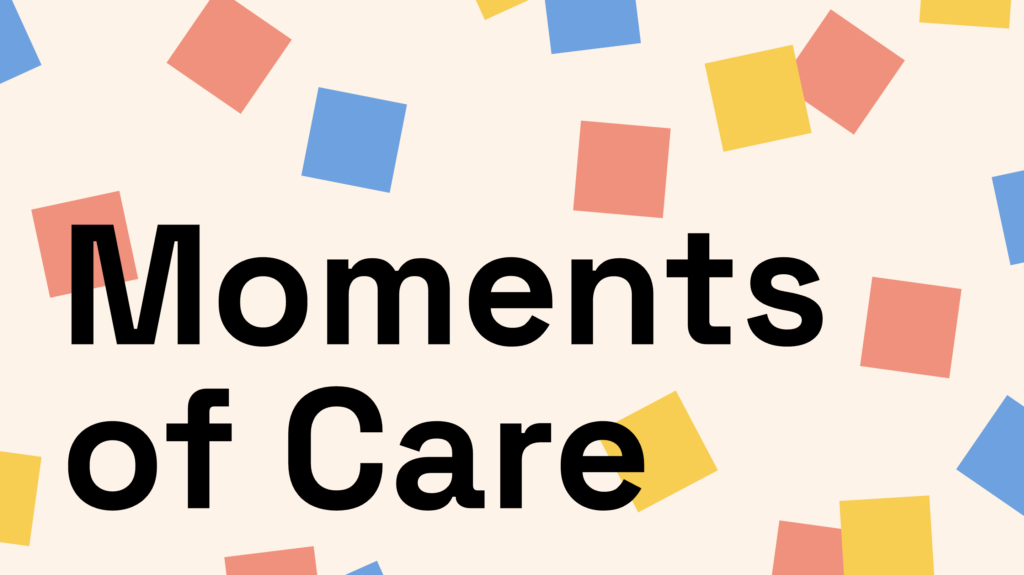
21.06.23

Despite their sometimes fleeting nature, small acts of care can go a long way in boosting our confidence, making us feel valued and reminding us that, as individuals, we’re part of something bigger. These moments often go undocumented and that’s okay – the intimacy of these instances can heighten how significant and genuine they feel. But what does it look like to take time to celebrate these exchanges – particularly in Dundee, well-known for its spirit of generosity and support?
Earlier this year, visual artist Robyn Scanlan created an interactive installation in the reception of Duncan of Jordanstone College of Art and Design. Titled Moments of Care, the project invited passersby to share experiences of care or collaboration, either by using sticky-notes on the wall or sitting and chatting with someone in the space. Acts of care are central to much of Robyn’s work: alongside her multi-disciplinary practice (which includes drawing, installation, sound, film, photography, performance and community engagement projects), she works in the health and social care sector and with a local community garden’s youth work team, creating safe and nurturing spaces for people to grow, learn, play and be creative.
We spoke to Robyn about how her project began, the importance of checking in on one another, and what remains after a small act of care. Inspired by Robyn’s project, we also invited our Amps network to share moments of care they’ve experienced within Dundee’s creative community – responses below.
In the studio, our technician Ronnie Oakley came round to take part in a weekly ritual in which he runs the taps for five minutes and takes a seat and chats with students about how their week has been. One day I noticed this, and I asked if he was doing this to prevent Legionella [a bacteria that can grow within a building’s water system and cause an infection called Legionnaires’ disease]. He was surprised and asked how I knew this, and I let him know I also carry out the same ritual during weekly health and safety flat checks in my housing support role with young people.
Often the young people think I’m being silly running the taps for so long until I explain why. This ritual often allows me an extra opportunity to ask the young people how they are and offer practical support. During the time in the studio, Ronnie shared that someone he knows lives in the project where I work. This small act of noticing during the five-minute task led to us finding out about shared community, roles and moments of care.
The project is ongoing, however responses around collaboration, patience, kindness, encouragement, acts of giving (whether it be physical things or people’s time), flexibility, empathy when things did not work out, and physical interaction – such as a handshake, hug or pat on the back during times of failure or misfortune.
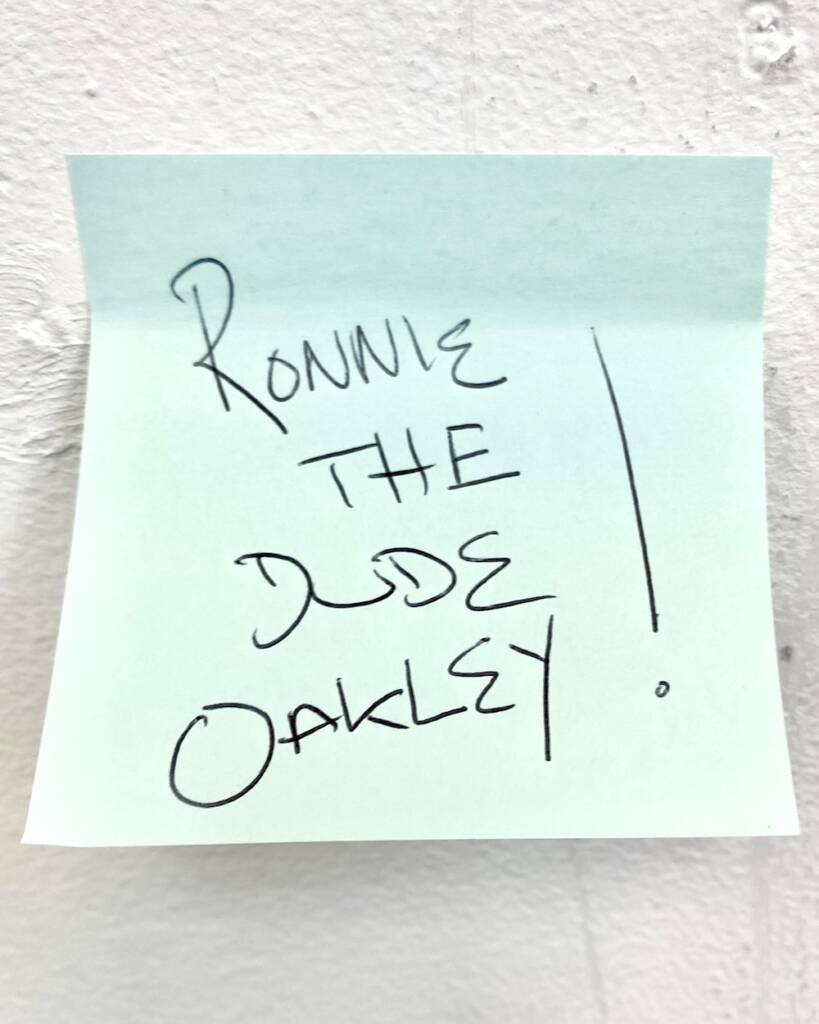
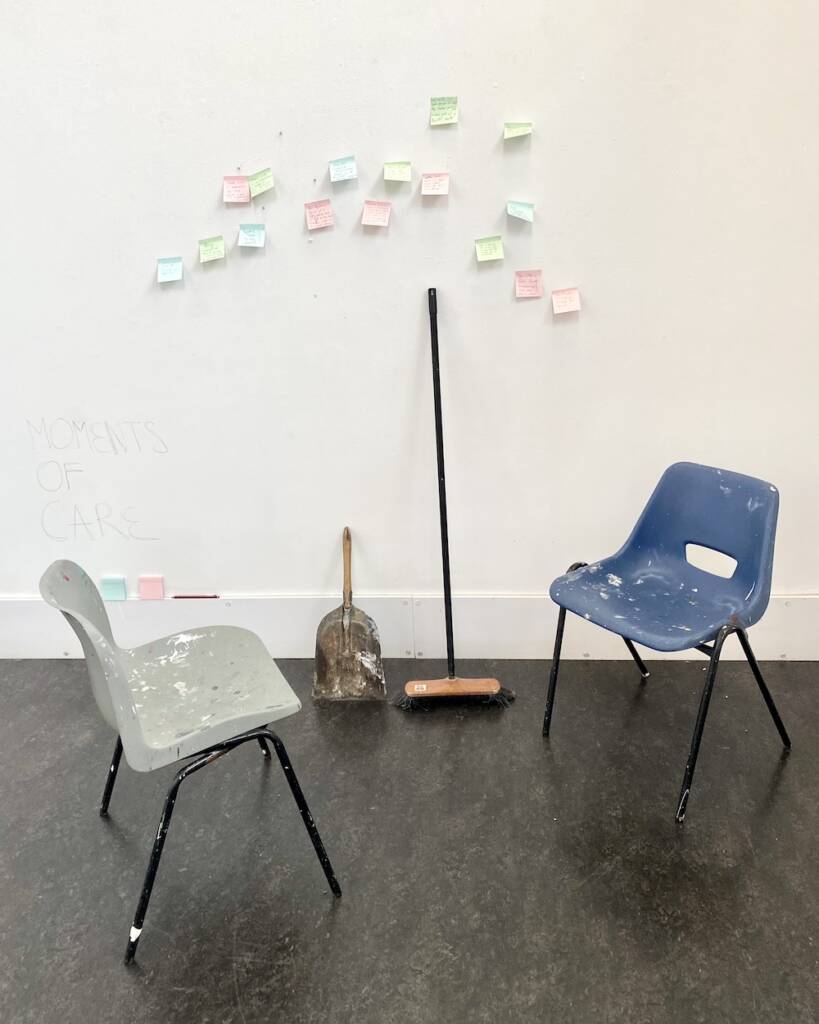
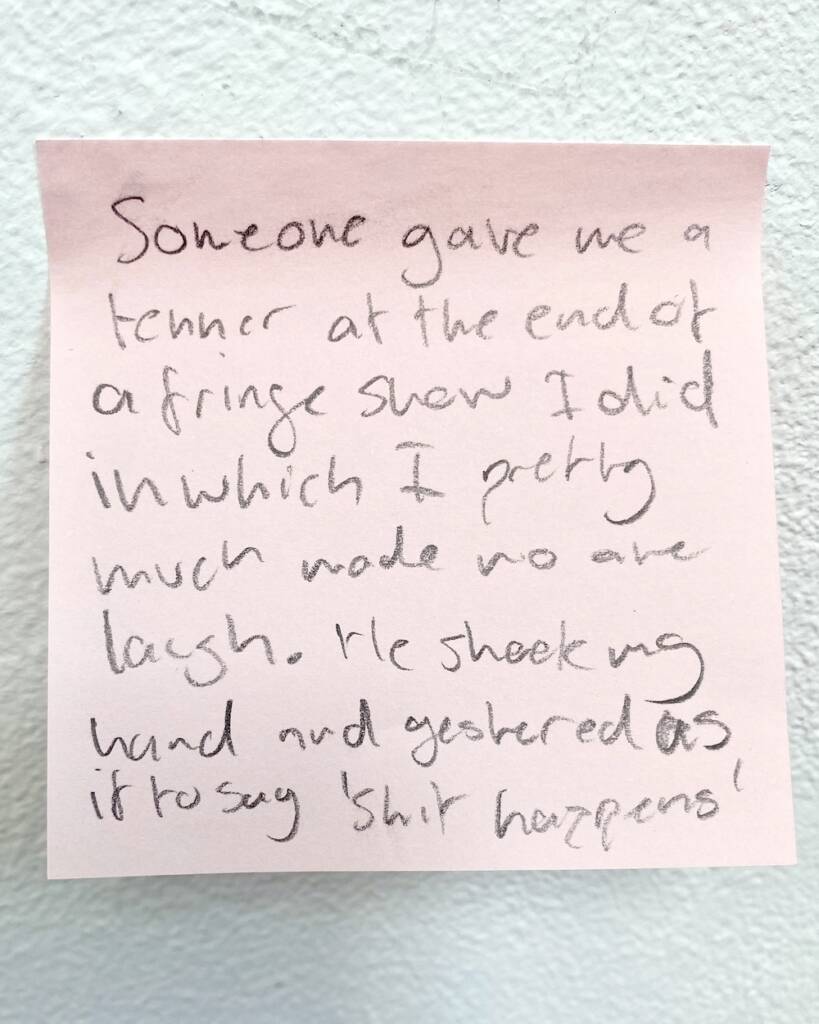
Someone had written in the installation that they were grateful that someone was willing to help last minute and be flexible with their time. This made me reflect on how scheduled our lives are now and how this unnatural flow takes away the human element of collaborating, and the care and sense of community people feel through managing their day-to-day lives more fluidly.
Yes, it’s made me think about how consistently showing up for people, both physically and emotionally, is an important part of community building even for small, often invisible or unseen tasks. It’s made me think about what remains after a task is completed, which is trust and a feeling of being nurtured.
Through modelling slowing down, taking time away from technology and being physically present, the response I have is authentic, trusting relationships with young people forming. This enables them to develop the communication skills they need to learn new skills, be encouraged to carry out tasks and positively participate in their wider community.
Sometimes purposely making time doesn’t always mean people will open up, as this is their choice, but it does foster trust and creates a nurturing environment which may encourage them to open up another time that they may need a listening ear, help or advice.
“Consistently showing up for people, both physically and emotionally, is an important part of community building even for small, often invisible or unseen tasks.”
Yes. Recently a colleague of mine expressed they don’t share how they feel anymore as it is often a question that comes out of courtesy rather than a genuine way of connecting. That’s why it’s important to have many ways of checking in with people and showing moments of care.
I feel there is no need to plan or build these rituals in as this only adds pressure due to having another task scheduled in. Using everyday events and instances in individual life spaces you find yourself in to discuss care and wellbeing is more natural. I feel it’s important to break away from a one-size-fits-all approach of sitting down and asking people how they are that has been passed on to modern communities through the institutionalisation of ‘care’ in its broadest sense. I find in my work with people, especially young people, that walking or doing practical tasks, such as cooking, eating, shopping and cleaning, are the best times for discussions.
I would like people to embrace more acts of care towards teenagers and young adults, who often find themselves without a space or place in our society. I remember when I was a teenager – having a particularly hard time trying to figure out my place in the world and come to terms with becoming a young adult – getting on the bus and the driver said, very tongue in cheek like, “smile, it can’t be that bad”. On reflection I wish he had asked if I was okay and if there was anything he could have helped with.
Recently I saw a story by a traveller in Japan, where it’s everyone’s collective responsibility to look after children, about a young child on the tram with a lady who he thought was her mum. It was a member of the public looking out for her as she was travelling to school independently. Many schools in Japan have children wear yellow or blue hats that make them more visible. In our communities it is young people who make themselves most heard and visible through their verbal and nonverbal, seen and unseen behaviour – is this simply due to them wanting to connect with us?
I spent time with the staff and volunteers at the MAXwell Centre and Garden recently. I was helping with the dishes after enjoying lunch together, and a volunteer asked how my studies are going and brought my cuppa through for me before it went cold, which was lovely – as a parent to a toddler, cold is normally how I drink my tea these days!
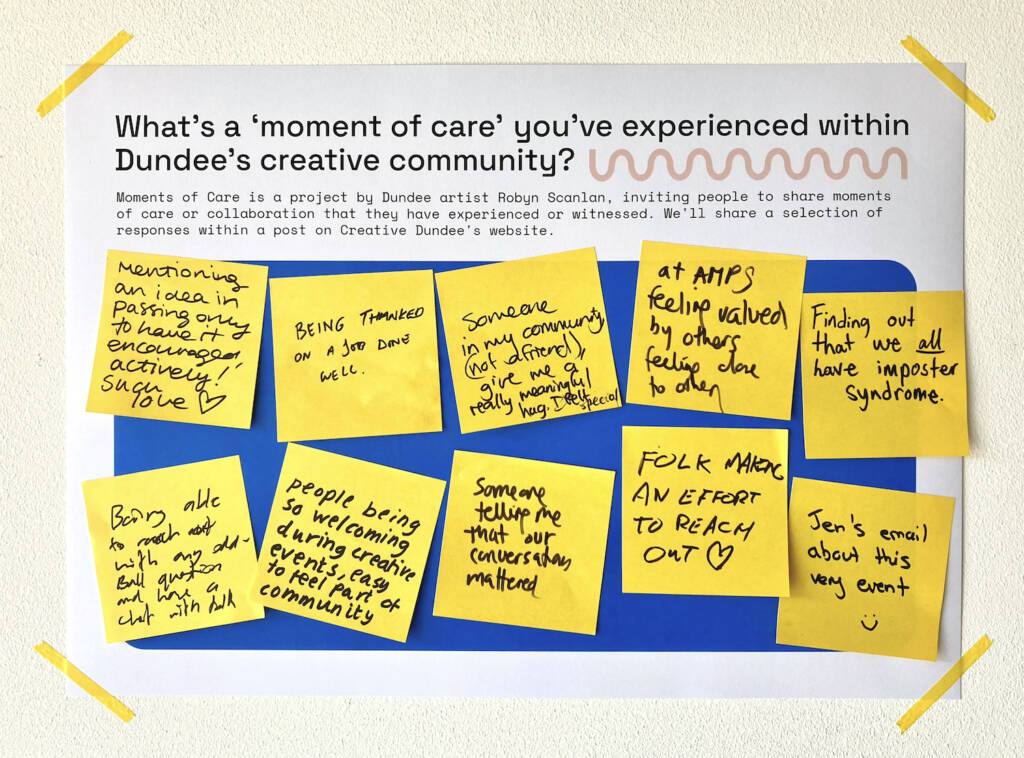
At a recent Amps Meet-Up, we invited our network to tell us about moments of care that they’d experienced within Dundee’s creative community. Here’s what they shared.
“Mentioning an idea in passing only to have it encouraged, actively! Such love.”
“Finding out that we all have imposter syndrome.”
“People being so welcoming during creative events, easy to feel part of community.”
“Everyone in the creative community in Dundee seems to be just an email away. Over the years I got in touch with people I never met asking for advice, suggesting ideas, proposing a partnership or simply inviting them for a coffee. The response has always been generous and warm. That accessibility has shaped my career and creative journey.“
“Someone in my community (not a friend) gave me a really meaningful hug. I felt special.”
“Being thanked on a job well done.”
“Folk making an effort to reach out.”
“Jen’s email about this very event.”
“At Amps, feeling valued by others, feeling close to others.”
“Being able to reach out with any odd-ball question and have a chat with folk.”
“Someone telling me that our conversation mattered.”
Thank you to Robyn for sharing her project with us – you can find more about her work on Instagram. Our Amps network is a community of people who support, value and make creativity in Dundee. Join the network and find out how to get involved in Ampersand+ – our peer-support project that helps make the informal sharing that’s vital to our creative ecosystem more visible and accessible.

If you would like to support us in creating even better content, please consider joining or supporting our Amps Community.